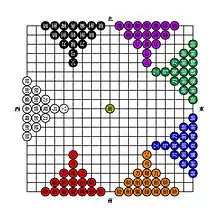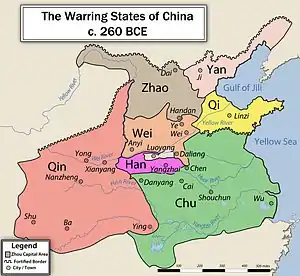Game of the Seven Kingdoms
Game of the Seven Kingdoms (Chinese: 七國象棋, p qī-guó-xiàng-qí ;) is a seven-player variant of the game xiangqi ("Chinese chess"). It is traditionally ascribed to Sima Guang, although he died well before the 13th century, to which this game is traditionally dated. There is skepticism regarding the game's 13th-century formulation.[2]
 Starting position | |
| Years active | Since 13th century |
|---|---|
| Genre(s) | Abstract strategy game Chess variant |
| Players | 7 |
| Skill(s) required | Strategy, tactics |
| Synonym(s) | Seven-handed xiangqi Qiquo xiangqi |

Game of the Seven Kingdoms symbolizes the Seven Warring States period (403–221 BC).[1]
See also
References
- Pritchard (1994), p. 265
- "The imbalance in the array must reflect on the play (assuming that the game was ever played), and can perhaps be attributed to the fact that a weiqi board rather than a bespoke board was used. The existence of pieces moving as Q and B at least two centuries before their introduction into orthochess is a phenomenon few will credit. (Leventhal, Chess of China)" (Pritchard 2007:343) [But note that the queen and bishop were already present in Japan in the game of dai shogi, invented in the 13th century and the most prestigious form of chess at the time in Japan.]
Bibliography
- Leary, Stephen (2001-09-29) [Created 1996-01-01]. "Qiquo Xiangqi: Chinese Chess with seven players". The Chess Variant Pages.
- Pritchard, D. B. (1994). "Seven-Handed Xiangqi". The Encyclopedia of Chess Variants. Games & Puzzles Publications. ISBN 0-9524142-0-1.
- Pritchard, D. B. (2007). "Seven-Handed Xiangqi". In Beasley, John (ed.). The Classified Encyclopedia of Chess Variants. John Beasley. pp. 342–43. ISBN 978-0-9555168-0-1.
This article is issued from Wikipedia. The text is licensed under Creative Commons - Attribution - Sharealike. Additional terms may apply for the media files.